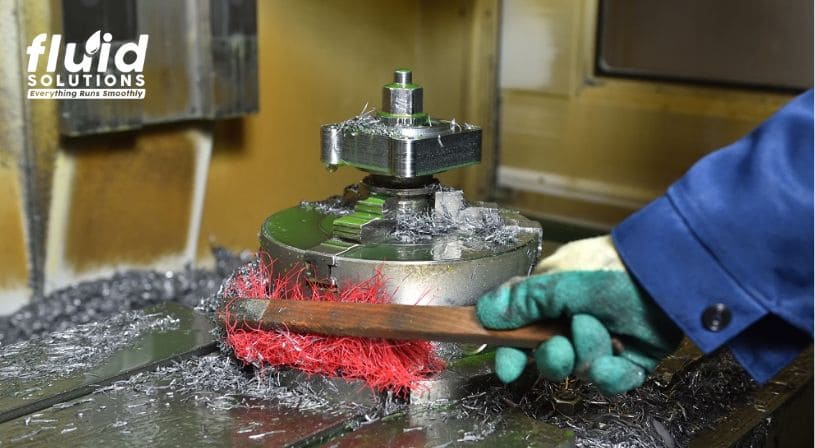
Dermatitis is a common skin condition that can develop when workers are exposed to certain chemicals or irritants. In industries that use machining and grinding fluids, workers are frequently in contact with cutting oils and coolants. This repeated exposure increases the risk of developing skin problems, including dermatitis. Occupational dermatitis prevention is essential to ensure a safe working environment. With proper precautions, the risks associated with skin irritation from cutting oils can be minimized, allowing workers to perform their tasks comfortably and safely.
The Risks of Dermatitis from Machining & Grinding Fluids
Cutting oils and coolants are indispensable in machining processes, but their chemical composition can pose a risk to workers’ skin. The primary concern is dermatitis, which can range from mild irritation to severe skin conditions requiring medical attention.
Prevention Measures

While it may be impossible to eliminate exposure to cutting oils and coolants entirely, implementing practical dermatitis prevention strategies can significantly reduce the risks. Here are some essential safety tips for handling cutting oils and coolants:
- Use the Correct Concentration: Always follow the manufacturer’s guidelines for mixing cutting fluids. Coolants and oils should not be used at higher concentrations than recommended. In general, concentrations higher than 10% can increase the risk of dermatitis.
- Regularly Remove Chips and Debris: Metal chips and debris in the bottom of the sump can recirculate into the coolant, increasing the risk of skin contact with irritating solids. Cleaning out these particles regularly will improve both the fluid’s efficiency and reduce the risk of skin irritation.
- Use Label-Free (Non-Hazardous) Fluids: Whenever possible, opt for non-hazardous cutting oils and coolants that have been specifically designed to be less harmful to skin. These products reduce the chances of irritation compared to more aggressive chemical formulations.
- Frequent Hand Washing: Workers should wash their hands and arms with mild soap every 3 to 4 hours during work breaks. Removing oils and coolants from the skin helps prevent irritation from prolonged exposure.
- Change Soiled Clothing Immediately: If clothing becomes soiled with cutting oils or coolants, it should be replaced with clean, dry clothing during work breaks. This simple step can prevent further skin exposure to the fluids.
- Use Protective Barriers: If wearing nitrile gloves or arm bands is impractical during machining processes, applying petroleum jelly to the hands and arms can create a barrier that protects the skin from direct contact with cutting oils and coolants.
- Wear Protective Gear: When handling concentrated cutting oils, coolants, or additives such as pH boosters and biocides, always wear nitrile gloves, arm bands, and safety goggles. These protective measures help shield the skin from harmful chemicals.
- Consult a Dermatologist: Workers experiencing skin irritation should consult a dermatologist for proper treatment. A doctor may prescribe ointments or creams to alleviate symptoms and prevent further complications.
- Reassign Sensitive Workers: If an individual is particularly sensitive to cutting oils and coolants, consider reassigning them to tasks that don’t involve direct exposure to chemicals.
- Ensure Proper Ventilation: Keep work areas well-ventilated, especially during hot and humid seasons. High temperatures can exacerbate the effects of chemical exposure, leading to more frequent skin irritation.
Machining & Grinding Fluids Manufacturers and Industrial Hygiene
When it comes to preventing dermatitis, the quality of cutting oils and coolants is just as important as the safety measures workers follow. Partnering with reputable industrial lubricants providers ensures that the products used in machining processes are designed with both performance and safety in mind. High-quality fluids contain fewer skin-irritating additives and are formulated to be effective without compromising worker safety.
Fluid Solutions is a leading provider of rust-preventive oils, cutting fluids, and other industrial lubricants. Our product range is designed to meet industry needs while maintaining high standards of industrial hygiene. By working with Fluid Solutions, you can ensure that your metalworking operations run smoothly, safely, and efficiently. Contact Fluid Solutions today at (02) 8370 5928 / (0917) 894 9156 or via email at inquiry@fluidsolutions.com.ph.


